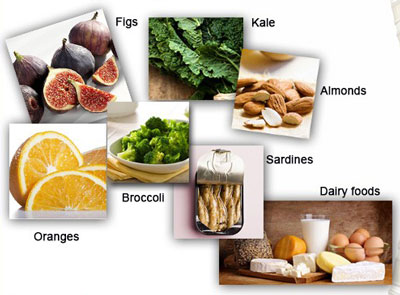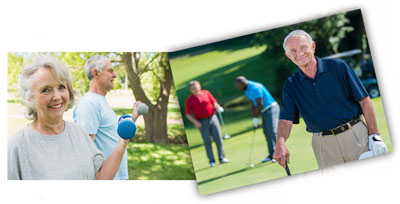Preventing falls is vitally important for Elders, as well as keeping bones strong.
Managing Osteoporosis can be achieved in a number of ways. Increasing your calcium intake helps to compensate for the calcium bleaching in the bones. Vitamin D helps to absorb the calcium, while the correct type of exercise helps to build bone and muscle strength.
National Osteoporosis Day
What is it? How do I manage it?
What is Osteoporosis?
Osteoporosis occurs when bones lose calcium and other minerals, making them fragile and more likely to fracture. In Australia, osteoporosis affects 1.2 million people it affects more than 1 in 5 women over the age of 65 years, compared with around 1 in 20 men.
Tips to maintain bone health
Foods
Calcium essential for building and maintaining bones. There are many foods that are rich in calcium. Recent studies have shown that foods containing calcium are far more beneficial for bone health than taking calcium supplements.
Exercise
Weight bearing exercise is a great way to maintain healthy bones.
Tips for increasing calcium intake
1. Dairy foods contain a high level of calcium which is easily absorbed – include 3 serves per day in your normal diet eg: glass of milk (250 ml), tub of yoghurt (200 g), slice of cheese (40 g).
2. Try canned salmon or sardines which contain bones rich in calcium. Sardines contain 351 ml in one 106gm can.
3. Use yoghurt in soups or salads
4. Add milk or skim milk powder to soups or casseroles
5. Try soy based products and tofu that contain calcium. Tofu contains 434 ml of calcium/cup
6. Include mustard cabbage, Bok Choy, silverbeet, cucumber, celery and chick peas in your regular diet.
7. Raw broccoli contains 86mls of calcium per 2 cups.
8. ale contains 101 ml of calcium per cup
9. Eat more almonds, dried figs and dried apricots. Dried figs contain 121 ml of calcium per ½ cup.
10. Oranges contain 74mls of calcium per medium orange
Vitamin D
Vitamin D deficiency is quite common with over 30% of Australian adults having a mild, moderate or even severe deficiency. Vitamin D is important for bone health because it helps your body absorb calcium. It also plays a role in:
- Supporting growth and maintenance of the skeleton;
- Regulating calcium levels in the blood.
Exercise
Our bones become stronger when a certain amount of impact or extra strain is placed on them. This means there are specific types of exercises that build bone strength and density.
Weight bearing exercise (exercise performed while on your feet so you bear your own weight). For example: brisk walking, jogging, skipping, basketball / netball, tennis, dancing, impact aerobics, stair walking and golf.
Progressive resistance training (becomes more challenging over time). For example: lifting weights – hand / ankle weights or gym equipment.
Exercise must be regular (at least 3 times per week)
It is normal to lose some bone mass as we get older. Osteoporosis occurs when there is a drastic thinning of the bone. Make sure you’re eating correctly and doing weight bearing exercises.
Calcium supplements do not help bone development
Two recent studies published in the British Medical Journal (BMJ) on 29 August 2015 show that:
1) There is no evidence that increasing calcium through supplements prevents fractures and they should not be recommended.
2) Taking calcium supplements to boost bone density or prevent fractures as people get older does not work.
Calcium supplements are often prescribed along with vitamin D for the estimated three million people with osteoporosis. Yet research published in the British Medical Journal in 2011 found that taking daily calcium supplements of 1g plus vitamin D increased the risk of heart attacks by 20 per cent.
The first of the 2015 studies published in the British Medical Journal, looked at whether dietary or supplemental calcium helped to increase bone density in people over the age of 50.
Researchers analysed 59 controlled trials; 15 focused on dietary calcium in 1,533 participants and 51 studied the effect of supplements in 12,257 participants. The studies found that calcium acquired through diet or supplement increased bone density by between 0.6 and 2 percent over the course of two years which researchers concluded, is unlikely to lead to a significant reduction in the risk of bone fractures.
In the second study, also published in the British Medical Journal, researchers looked at 50 reports based on 44 cohort studies on the effects of dietary, milk and dairy intake. They found that most showed that there is no relation between any form of dietary intake of calcium and incidence of fracture. The same study included a review of 26 studies with around 50,000 participants taking calcium supplements. They found that they also had little effect on the risk for bone fracture.
Evidence suggests that most people should be getting enough calcium through a normal diet. They also suggested that foods rich in calcium include dairy products, vegetables such as broccoli and cabbage, soya beans, nuts, and anything made with fortified flour.
Professor Karl Michaëlsson of Uppsala University writes in an editorial, also published in the British Medical Journal that both studies call calcium intake guidelines for older people into question. They should be re-evaluated, not only for their usefulness but the potential health risk they may pose.
“Most will not benefit from increasing their intake and will be exposed instead to a higher risk of adverse reactions such as constipation, cardiovascular events, kidney stones, or admission for acute gastrointestinal symptoms. Michaëlsson wrote, “The weight of evidence against such mass medication of older people is now compelling and it is surely time to reconsider these controversial recommendations.”
The Daughterly Care Joyful Living Approach™ supports people living with Osteoporosis by preparing calcium rich home cooked meals, taking clients for walks in their favourite locations. This provides them with Vitamin D and weight bearing exercise.
We can also advise on correct footwear to make walking easier and appropriate walking support equipment. Walking with our clients also reduces their risk of falls and increases their quality of life.
If you would like to arrange a free in home consultation to discuss your individual care needs, we’d love to send one of our Nurses to meet you personally. Call us to arrange an appointment on 02 99707333.
Source
http://www.myvmc.com/videos/osteoporosis-and-our-bones
http://www.health.com/health/gallery/0,,20845429,00.html



Not until I broke my wrist did I know how important food and exercise is to strengthen my bones, something we may have taken for granted until the trauma of a broken bone.
Sorry to hear about your broken wrist Wendy. I think a lot of people make changes for the better after a traumatic incident. Enjoy your great food and exercise. I know you cook great meals.
Great information, I’m a big fan of ‘food as medicine’.
Thanks for sharing Jackie. I know people love the meals you prepare.